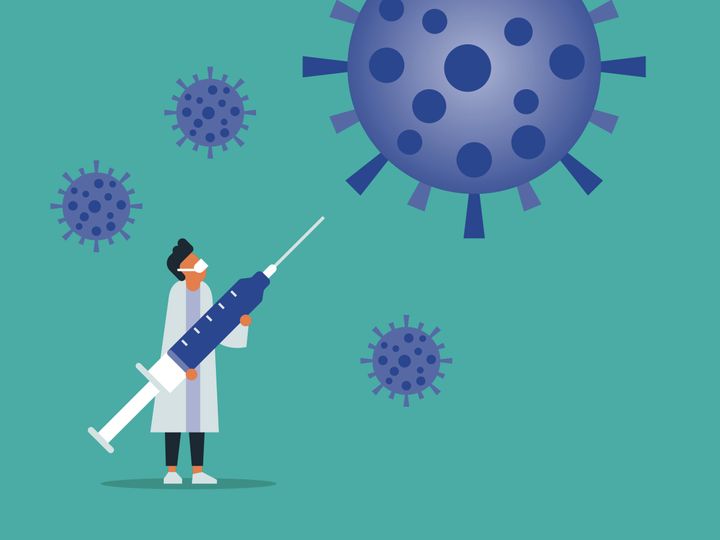News
Will The COVID-19 Vaccine Work On New Mutations Of The Virus?
Not surprisingly, the words “COVID-19 mutations” stir up worry. We have felt the very real consequences of the coronavirus pandemic, and the vaccine rollout brought an inkling of hope. Will new strains of the virus threaten that?
The good news: Experts don’t believe so. Many remain hopeful the COVID vaccine will still help our bodies produce a helpful immune response against new strains of the SARS-Cov-2 virus (the virus causing COVID-19).
“The expectation is that the vaccine should still provide some protection,” said Deborah Fuller, a professor in the department of microbiology at the University of Washington School of Medicine.
“If you get a certain mutation, it’s possible the level of efficacy could decline a little bit,” Fuller continued. “But with some of these vaccines being above 90% effectiveness, the expectation is that ― in a worst case scenario with some of these mutations ― it might say drop to say 85% effectiveness, which is still very effective.”
Research suggests that the Pfizer vaccine is effective against the new, more contagious strains we’ve seen appear in recent weeks. Data is still being collected on this for the Moderna vaccine, but the company expects that the shot will protect against the new variants, too.
Here’s what to know about the vaccines and future mutations of the virus (and why we shouldn’t totally panic over anything yet):
The vaccine triggers a release of many different types of antibodies.
When the COVID-19 vaccine enters your body, it induces the body to produce two kinds of immune responses, explained Paula Cannon, a professor of molecular microbiology and immunology at the University of Southern California’s Keck School of Medicine. This primes the body to enact these responses whenever it is exposed to the spike protein on the surface of the SARS-CoV-2 virus.
Cannon said the reason scientists expect the vaccine to still work to some degree is because these immune responses are “polyclonal.” Simply put, this means there are built-in backup plans. The vaccine prompts production of multiple antibodies to target different regions of the spike protein.
“Even if one part of the spike protein changed slightly, and the antibody that had latched on to this part of the spike protein could no longer recognize it, there are still tens of hundreds of other antibodies that can stick onto different parts of the spike protein, and still coat it and stop it from working,” Cannon explained. “It still looks to the immune system like the same spike protein.”
A mutation that causes the virus to completely evade the vaccine doesn’t happen as easily as you may think.
For the vaccine to be rendered useless against the virus, “the virus would need to come up with a combination of mutations that allows it to eventually evade the vaccine,” Fuller said. “That’s not to say it couldn’t. But it’s going to be hard for it to do that and it might take a while for it to get to that point.”
A reason for this is that SARS-CoV-2 virus mutates slowly, added Catherine Blish, a translational immunologist and associate professor of medicine at Stanford University. To put it into context, it mutates slower than the influenza virus, which requires an updated vaccine annually.
Virus mutations ― which happen in the normal life cycle of a virus ― are also being closely monitored by scientists, who are looking at the genetic sequence of the virus, Cannon said. Genomic surveillance allows scientists to “monitor whether the new variant starts to appear and spread within our cities and see if any other variants might arise that we need to keep an eye on,” Cannon explained.
During the vaccine design process, scientists test the vaccine against emerging viral variants to make sure it still produces an appropriate immune response. Taking a blood sample from a vaccinated person, they expose it to a viral variant to see whether the antibodies in their blood can neutralize it. According to Fuller, this is done even for variants which have not developed any concerning properties.
Even if the worst case scenario happens ― where the virus mutates enough to breeze past the vaccine’s antibody response ― Fuller explained the mRNA vaccine (the type of vaccine released by Pfizer and Moderna) has another line of defense. The second immune response it triggers is called the T-cell response. Though SARS-CoV-2 may enter your body’s cells, white blood cells known as T-cells are programmed to find and rid your body of these infected cells.
New variants of the virus will meet their match in updated vaccine boosters.
The mRNA vaccines can also be updated, which would take around three months, Fuller said. Updating vaccines isn’t out of the ordinary. The yearly flu shot an example of tweaking a vaccine in response to a virus mutation.
Both Blish and Fuller suspect something similar may be in the cards for COVID, with people receiving updated vaccines in the form of booster immunizations every few years. Like the flu vaccine, these would build on immunity we’ve developed from prior vaccinations, to keep our immunity at a high level and prevent another pandemic.
None of this is to say that mutations aren’t concerning ― but overall, scientists did expect this to happen. The best we can do for right now is to keep practicing what we know works: wearing masks, keeping physical distance from others, and getting the vaccine when it’s our turn to do so.
Experts are still learning about COVID-19. The information in this story is what was known or available as of publication, but guidance can change as scientists discover more about the virus. Please check the Centers for Disease Control and Prevention for the most updated recommendations.
Read more

